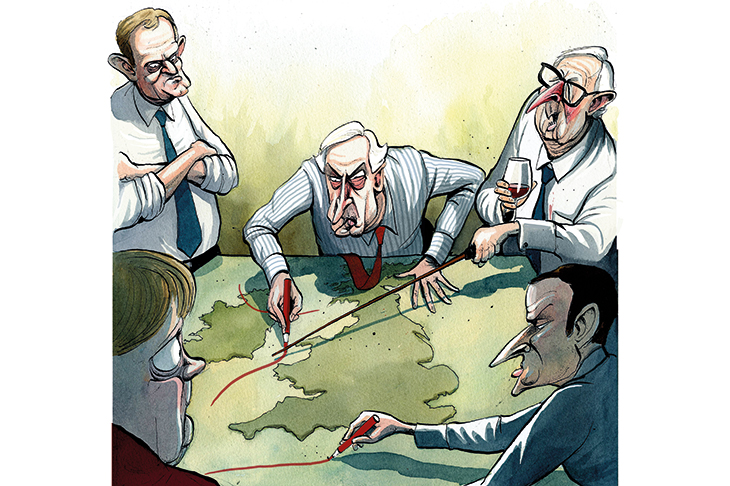England was already divided. Brexit is only making it worse

Locals laugh ruefully at the sight, for they remember fondly what once stood there before the store — a renowned Yale lockworks factory.”If you’ve got to put that on the wall, Willenhall isn’t wonderful — you don’t have to convince yourself,” Roger Wilcox, a local resident, said with a chuckle. This small town lies around 15 miles northwest of Birmingham in England’s “Black Country,” an area that some say was named after the smoke created by the explosion of factories, mines and mills here during the Industrial Revolution. It then sat at the heart of the country’s lock-making industry, which required skills that were passed down through generations and employed thousands of people. But it no longer exists. British lock-making declined in the late 1980s when it became cheaper to import from abroad, and many businesses closed. The decline hit families hard in the region, rendering the many skills locals had redundant overnight, and stalling Willenhall’s growth. “Almost every day you’d see a piece of machinery on a flatbed lorry leaving the town and you’d think, ‘that’s been sold to India, that’s been sold to China’ and of course the jobs are going as well,” Wilcox said.Willenhall, situated in the Metropolitan Borough of Walsall, is now among the most deprived areas in England, with poorer health and higher rates of unemployment than other areas of the country. The area also voted by 67.9% to leave the European Union in the UK’S 2016 referendum.Walsall North, Willenhall’s constituency, also contributed the fewest signatures of any constituency to the Revoke Article 50 petition in March 2019, calling for the UK to remain in the EU.This petition was so popular it repeatedly crashed the UK Parliament website and made headlines for attracting more than 6 million signatures. ]]]]>]]>Only 1,900 residents from Walsall North signed the petition while the southwestern city of Bristol — which voted 61.7% to remain in the EU — sat at the opposite end of the scale. More than 37,000 people from the Bristol West constituency demanded Brexit be canceled.The attempt failed, but these signatures — or lack thereof — tell the story of a divide between two Englands that existed long before the Brexit vote but surfaced in its aftermath.Brexit ‘crystallized’ England’s divideMany people now see themselves either as as Leavers or Remainers, and it’s this “Brexit identity” that has cemented age-old splits throughout UK society — by class, age, values and geography.Will Jennings, a professor of political science and public policy at the University of Southampton, said these divides are more important than ever. Partly that’s because London still dominates the UK, but also post-industrial towns — many of them in the Midlands and north — have found it difficult to adapt after long-term economic and demographic decline.”The major difference that we see between core cities and smaller towns is the great divergence between the age of population,” said Jennings, who has spent five years studying how Britain’s core economic model favors its cities over its towns. Over the past 30 years English towns have aged, while cities, such as Bristol, have become younger and younger. And by losing key trades, towns such as Willenhall have lost a large amount of jobs. The number of people with professional qualifications and skills has stagnated as the young move to cities.Brexit has “crystallized” England’s divide, Jennings told CNN, fueling “a politics of resentment, or cultural backlash … because the populations of different parts of the same country … hold increasingly divergent views.” ]]]]>]]>’The land that time forgot’Wilcox, who worked as a police officer in Willenhall for 30 years, believes the town voted so heavily to leave the EU because locals feel it’s “the land that time forgot.”He said residents here often feel they’re the last — if at all — to be considered or consulted during policy changes. For them, the future feels like something that’s happening elsewhere.”I think the Black Country and the West Midlands has long been seen to be behind the curve. I remember my wife saying when she worked in London in Oxford Street that if a rep was sent to the West Midlands, it was considered to be a punishment posting.”Mike Batchelor, a project manager at a local charity store and advice center, Bridging the Gap, said locals now call Willenhall a “dormitory town” — a place with no major industries where people travel to larger towns or cities nearby for work. Things began to feel different when factories closed after the recession in the late 1980s, he reflects.”At first people could transfer from one engineering industry to another because of transferable skills but as more and more of the engineering factories closed down and manufacturing changed or went abroad … the hands-on skills were not needed anymore,” Batchelor said.”The area itself started to feel depressed — not just individuals, but because the whole of society was changing.”Batchelor remembers how the main street used to be bustling in the 1960s, when factory workers — who all lived locally — would pour onto the street and into the street market. “You would have to weave your way in and out of people,” he recalls. While the market still runs, on a smaller scale, only a few original shops remain on the main street. Some new stores have opened, but many others are advertised as “to let.” Willenhall’s police station, train station and post office have also closed.”It’s those little things where the town has lost its status,” Wilcox said. “We have lost significant parts of our identity.”The loss of something like a train station greatly inhibits economic opportunity. “What we’re seeing is that geography and connectivity matters more than ever in the global community,” Jennings said. “Where you are and how you are connected to things is both important for economic opportunity but also important in terms of support services.” As a result, younger people, including Batchelor’s children, have moved away to cities for better opportunities and “don’t tend to come back.”This anecdote is clearly illustrated in Willenhall’s demographic statistics. There’s been a 32% decrease in those aged 24 or younger and a 45% increase in those aged over 65 in the last 30 years, and that’s just one example of what’s happening to towns all over the country.’12 separate towns stitched together’Meanwhile, cities are getting younger and more diverse. With a population of around 460,000 Bristol has become the second most populous city in southern England and was declared the best place to live in the UK in 2017 by the The Sunday Times.”What you have is a cocktail of things (in Bristol),” its mayor, Marvin Rees told CNN. “(It’s) city that goes on being international, a world-class university, a thriving creative sector that’s grown.” ]]]]>]]>During a short drive from its main train station it becomes clear how eclectic the city is — with various districts, each with their own distinct character. There’s a shopping quarter, a redeveloped harborside, leafy Clifton with upscale boutiques and beautiful Georgian homes, and Stokes Croft, with a vibrant artist community and walls upon walls of street art. “Bristol’s an interesting place. It’s almost like 12 completely separate towns that have all been stitched together,” said local Sam Hickmott, who’s also part of the pro-EU political group Bristol for Europe.It has become attractive to not only international migrants, but it also has the highest net internal migration in the UK. “There’s a head of steam that ends up here. The more exciting and innovative and creative and diverse the city becomes it attracts those people who are drawn to that and they invest in it and they grow it,” Rees said.A microcosm of EnglandWhile there are a lot of positives about Bristol in the way its economy is flourishing, it’s also a city that suffers from inequality. “There are parts of the city that are very connected to the center and there are peripheral parts of Bristol … that are exhibiting the same sorts of dynamics [as towns] on a micro level,” Jennings said.Just five miles south of Bristol’s city center is Hartcliffe, a suburb that consists largely of public housing and suffers from the city’s greatest levels of deprivation. It also voted to leave the EU. Here men will die an average of 10 years earlier than those in the district of Hotwells near the city center. Young people are also significantly less likely to go on to higher education. This inequality is something Bristol’s mayor experienced first-hand.”As a young kid growing up in Bristol there were periods where I felt quite hopeless, like I was looking in on all this prosperity and this opportunity and it wasn’t for me,” Rees remembers. “I’ve lived on the underbelly of Bristol in many ways and yet, this is a city that … then ultimately voted for me to become Mayor.”As a result of the deprivation suffered by many throughout the country, Rees believes Brexit is the “wrong answer to the right problem.””The right problem are all those things that people are citing, but Brexit isn’t going to solve those,” he said. “The architects of Brexit don’t have any track record of delivering on poverty, social inclusion and empowerment of people who have been left behind by the political system.”Jennings echoes this sentiment. “Without a fundamental change to an economic model that’s based on agglomeration of city regions, it seems unlikely that these divisions are going to go away — regardless of what happens with Brexit. “We’re going to continue to see the sorts of pressure on demographics that are driving places apart.”However in Willenhall, Wilcox remains optimistic, despite the town’s decline.”As long as the economy keeps growing, it will trickle down and eventually, last of all, it will reach places like this.”







